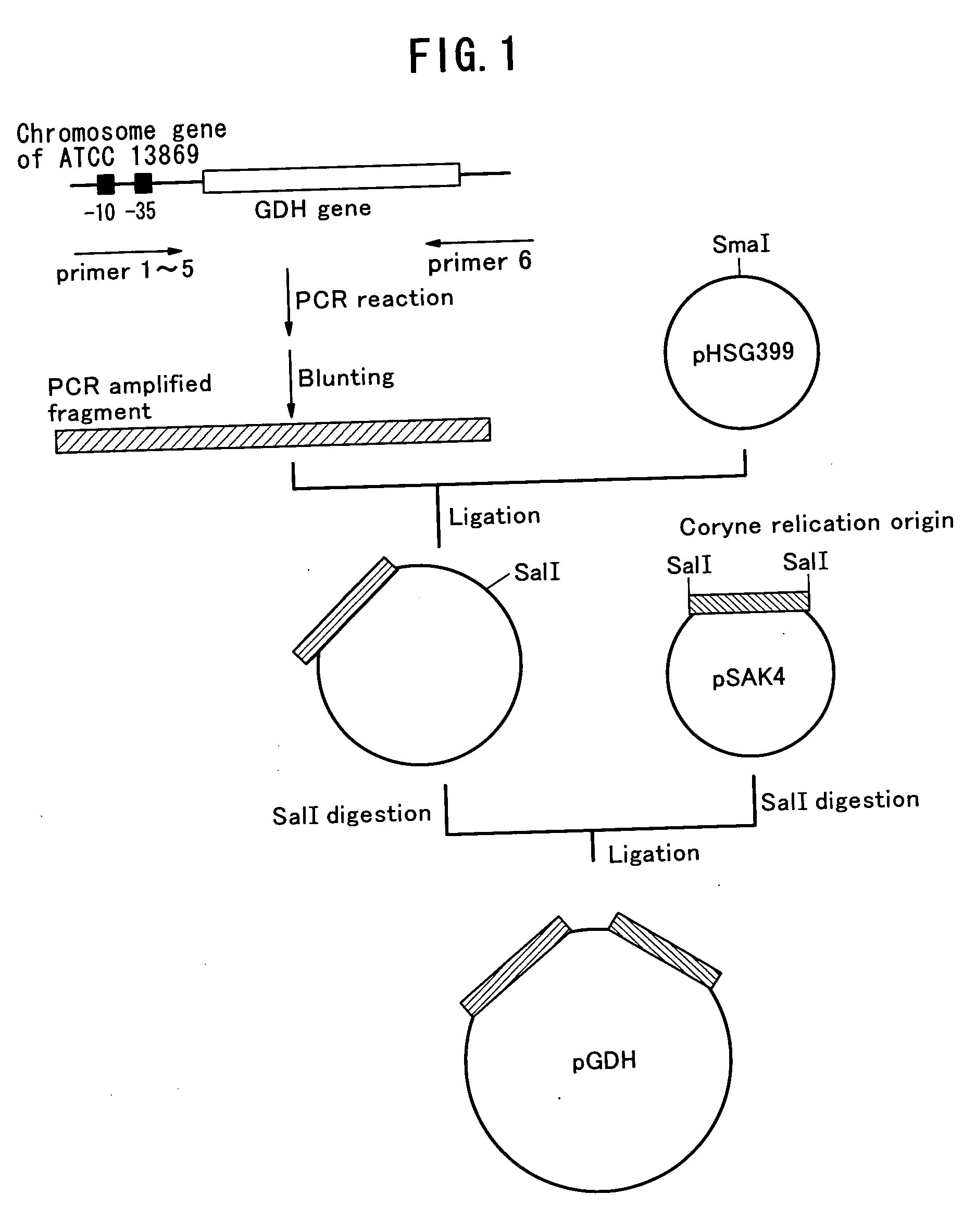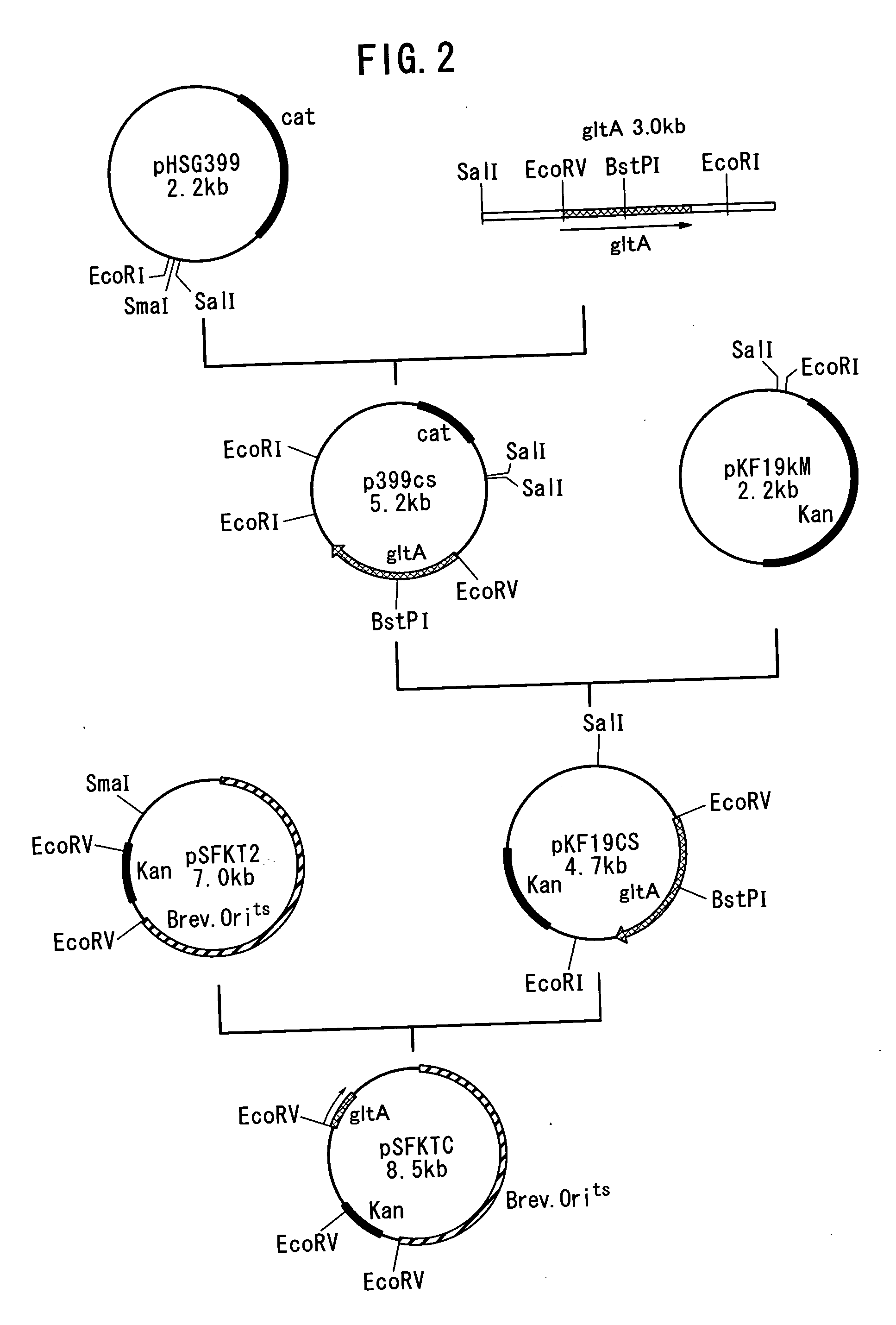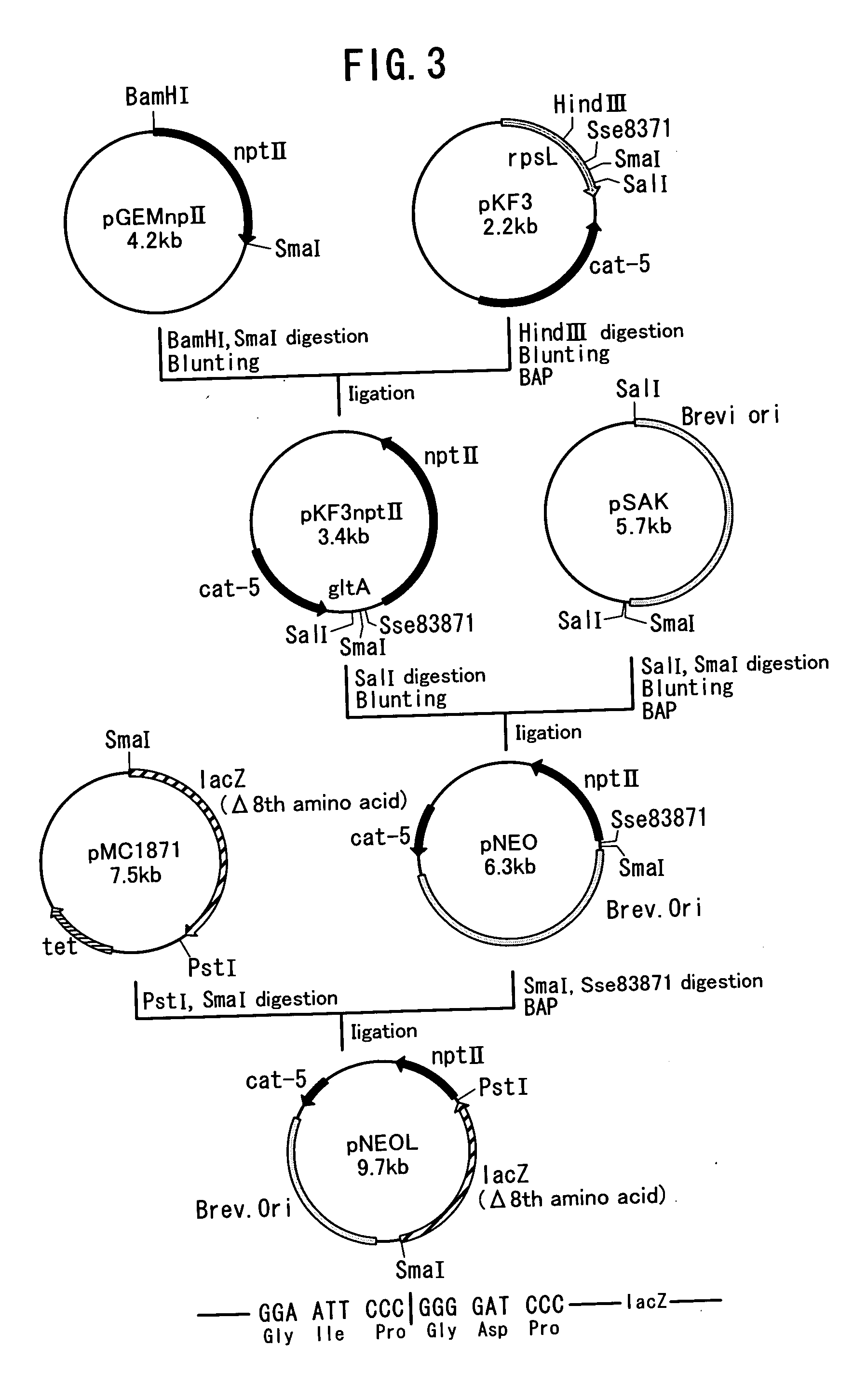Method of constructing amino acid producing bacterial strains, and method of preparing amino acids by fermentation with the constructed amino acid producing bacterial strains
a technology of constructed amino acids and bacterial strains, which is applied in the direction of enzymology, peptides, transferases, etc., can solve the problems of lowering the capacity to produce the intended substance, serious inability to grow, and difficulty in enhancing the expression of an intended gene with a plasmid. achieve the effect of enhancing or controlling the expression of an intended gene and producing amino acids in a high yield
- Summary
- Abstract
- Description
- Claims
- Application Information
AI Technical Summary
Benefits of technology
Problems solved by technology
Method used
Image
Examples
example 1
Production of Mutant GDH Promoter
[0066] A mutant GDH promoter was prepared by site-directed mutagenesis method as follows:
(1) Preparation of GDH Genes Having Various Mutant Promoters:
[0067] The wild type sequence in −35 region and −10 region of a promoter of GDH gene of a coryneform bacteria is shown in sequence 1. The promoter sequence of wild type has already been reported [Molecular Microbiology (1992), 6, 317-326].
[0068] The method of preparing a plasmid carrying GDH gene having a mutant promoter is as follows:
[0069] As shown in FIG. 1, a chromosomal gene of a wild type strain of a coryneform bacterium ATCC13869 prepared with “Bacterial Genome DNA purification kit” (Advanced Genetic Technologies Corp.) was used as the template for PCR. The gene amplification was conducted by PCR using upstream and downstream sequences of GDH gene. Both ends were blunt-ended. The product thus obtained was inserted in SmaI site of plasmid pHSG399 (a product of Takara Shuzo Co., Ltd.). Then a...
example 2
Preparation of Mutant Strains
(1) Preparation of Mutant Strains Resistant to 4-Fluoroglutamic Acid:
[0074] AJ13029 is a mutant strain producing glutamic acid and disclosed in WO96 / 06180. Although it does not produce glutamic acid at a culture temperature of 31.5° C., it produces glutamic acid even in the absence of a biotin-inhibitor when the culture temperature is shifted to 37° C. In this Example, Brevibacterium lactofermentum AJ13029 strain was used as the parent strain for preparing the mutant strains. As a matter of course, any of glutamic acid-producing strains other than AJ13029 can be used as a parent strain for preparing mutant strains resistant to 4-fluoroglutamic acid.
[0075] AJ13029 were cultured on a CM2B agar medium (Table 2) at 31.5° C. for 24 hours to obtain the bacterial cells. The cells were treated with 250 μg / ml aqueous solution of N-methyl-N′-nitro-N-nitrosoguanidine at 30° C. for 30 minutes. Then a suspension of the cells having a survival rate of 1% was sprea...
example 3
Introduction of Mutation into CS Gene Promoter Region of Coryneform Glutamate-Producing Bacterium
[0081] In this Example, a strain having an enhanced promoter for the genes which codes glutamate dehydrogenase (GDH) and citrate-synthesizing enzyme (CS) was produced.
[0082] The sequence of gltA gene of a coryneform bacterium, which codes citrate-synthesizing enzyme, has already been elucidated [Microbial. 140, 1817-1828 (1994)]. On the basis of this sequence, primers shown in Seq ID No. 7 and Seq ID No. 8 were synthesized. On the other hand, chromosomal DNA from Brevibacterium lactofermentum ATCC13869 was prepared using Bacterial Genome DNA Purification Kit (Advanced Genetic Technologies Corp.). Sterilized water was added to a mixture of 0.5 μg of the chromosomal DNA, 10 pmol of each of the oligonucleotides, 8 μl of dNTP mixture (2.5 mM each), 5 μl of 10×La Taq Buffer (Takara Shuzo Co., Ltd.) and 2 U of La Taq (Takara Shuzo Co., Ltd.) to obtain 50 μl of PCR ...
PUM
| Property | Measurement | Unit |
|---|---|---|
| culture temperature | aaaaa | aaaaa |
| temperature | aaaaa | aaaaa |
| temperature | aaaaa | aaaaa |
Abstract
Description
Claims
Application Information
 Login to View More
Login to View More - R&D
- Intellectual Property
- Life Sciences
- Materials
- Tech Scout
- Unparalleled Data Quality
- Higher Quality Content
- 60% Fewer Hallucinations
Browse by: Latest US Patents, China's latest patents, Technical Efficacy Thesaurus, Application Domain, Technology Topic, Popular Technical Reports.
© 2025 PatSnap. All rights reserved.Legal|Privacy policy|Modern Slavery Act Transparency Statement|Sitemap|About US| Contact US: help@patsnap.com



